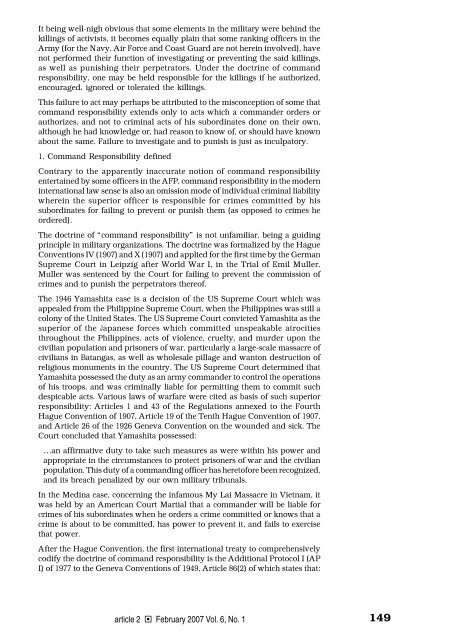of the Philippines the criminal justice system is - Article 2
of the Philippines the criminal justice system is - Article 2
of the Philippines the criminal justice system is - Article 2
Create successful ePaper yourself
Turn your PDF publications into a flip-book with our unique Google optimized e-Paper software.
It being well-nigh obvious that some elements in <strong>the</strong> military were behind <strong>the</strong><br />
killings <strong>of</strong> activ<strong>is</strong>ts, it becomes equally plain that some ranking <strong>of</strong>ficers in <strong>the</strong><br />
Army (for <strong>the</strong> Navy, Air Force and Coast Guard are not herein involved), have<br />
not performed <strong>the</strong>ir function <strong>of</strong> investigating or preventing <strong>the</strong> said killings,<br />
as well as pun<strong>is</strong>hing <strong>the</strong>ir perpetrators. Under <strong>the</strong> doctrine <strong>of</strong> command<br />
responsibility, one may be held responsible for <strong>the</strong> killings if he authorized,<br />
encouraged, ignored or tolerated <strong>the</strong> killings.<br />
Th<strong>is</strong> failure to act may perhaps be attributed to <strong>the</strong> m<strong>is</strong>conception <strong>of</strong> some that<br />
command responsibility extends only to acts which a commander orders or<br />
authorizes, and not to <strong>criminal</strong> acts <strong>of</strong> h<strong>is</strong> subordinates done on <strong>the</strong>ir own,<br />
although he had knowledge or, had reason to know <strong>of</strong>, or should have known<br />
about <strong>the</strong> same. Failure to investigate and to pun<strong>is</strong>h <strong>is</strong> just as inculpatory.<br />
1. Command Responsibility defined<br />
Contrary to <strong>the</strong> apparently inaccurate notion <strong>of</strong> command responsibility<br />
entertained by some <strong>of</strong>ficers in <strong>the</strong> AFP, command responsibility in <strong>the</strong> modern<br />
international law sense <strong>is</strong> also an om<strong>is</strong>sion mode <strong>of</strong> individual <strong>criminal</strong> liability<br />
wherein <strong>the</strong> superior <strong>of</strong>ficer <strong>is</strong> responsible for crimes committed by h<strong>is</strong><br />
subordinates for failing to prevent or pun<strong>is</strong>h <strong>the</strong>m (as opposed to crimes he<br />
ordered).<br />
The doctrine <strong>of</strong> “command responsibility” <strong>is</strong> not unfamiliar, being a guiding<br />
principle in military organizations. The doctrine was formalized by <strong>the</strong> Hague<br />
Conventions IV (1907) and X (1907) and applied for <strong>the</strong> first time by <strong>the</strong> German<br />
Supreme Court in Leipzig after World War I, in <strong>the</strong> Trial <strong>of</strong> Emil Muller.<br />
Muller was sentenced by <strong>the</strong> Court for failing to prevent <strong>the</strong> comm<strong>is</strong>sion <strong>of</strong><br />
crimes and to pun<strong>is</strong>h <strong>the</strong> perpetrators <strong>the</strong>re<strong>of</strong>.<br />
The 1946 Yamashita case <strong>is</strong> a dec<strong>is</strong>ion <strong>of</strong> <strong>the</strong> US Supreme Court which was<br />
appealed from <strong>the</strong> Philippine Supreme Court, when <strong>the</strong> <strong>Philippines</strong> was still a<br />
colony <strong>of</strong> <strong>the</strong> United States. The US Supreme Court convicted Yamashita as <strong>the</strong><br />
superior <strong>of</strong> <strong>the</strong> Japanese forces which committed unspeakable atrocities<br />
throughout <strong>the</strong> <strong>Philippines</strong>, acts <strong>of</strong> violence, cruelty, and murder upon <strong>the</strong><br />
civilian population and pr<strong>is</strong>oners <strong>of</strong> war, particularly a large-scale massacre <strong>of</strong><br />
civilians in Batangas, as well as wholesale pillage and wanton destruction <strong>of</strong><br />
religious monuments in <strong>the</strong> country. The US Supreme Court determined that<br />
Yamashita possessed <strong>the</strong> duty as an army commander to control <strong>the</strong> operations<br />
<strong>of</strong> h<strong>is</strong> troops, and was <strong>criminal</strong>ly liable for permitting <strong>the</strong>m to commit such<br />
despicable acts. Various laws <strong>of</strong> warfare were cited as bas<strong>is</strong> <strong>of</strong> such superior<br />
responsibility: <strong>Article</strong>s 1 and 43 <strong>of</strong> <strong>the</strong> Regulations annexed to <strong>the</strong> Fourth<br />
Hague Convention <strong>of</strong> 1907, <strong>Article</strong> 19 <strong>of</strong> <strong>the</strong> Tenth Hague Convention <strong>of</strong> 1907,<br />
and <strong>Article</strong> 26 <strong>of</strong> <strong>the</strong> 1926 Geneva Convention on <strong>the</strong> wounded and sick. The<br />
Court concluded that Yamashita possessed:<br />
…an affirmative duty to take such measures as were within h<strong>is</strong> power and<br />
appropriate in <strong>the</strong> circumstances to protect pr<strong>is</strong>oners <strong>of</strong> war and <strong>the</strong> civilian<br />
population. Th<strong>is</strong> duty <strong>of</strong> a commanding <strong>of</strong>ficer has heret<strong>of</strong>ore been recognized,<br />
and its breach penalized by our own military tribunals.<br />
In <strong>the</strong> Medina case, concerning <strong>the</strong> infamous My Lai Massacre in Vietnam, it<br />
was held by an American Court Martial that a commander will be liable for<br />
crimes <strong>of</strong> h<strong>is</strong> subordinates when he orders a crime committed or knows that a<br />
crime <strong>is</strong> about to be committed, has power to prevent it, and fails to exerc<strong>is</strong>e<br />
that power.<br />
After <strong>the</strong> Hague Convention, <strong>the</strong> first international treaty to comprehensively<br />
codify <strong>the</strong> doctrine <strong>of</strong> command responsibility <strong>is</strong> <strong>the</strong> Additional Protocol I (AP<br />
I) <strong>of</strong> 1977 to <strong>the</strong> Geneva Conventions <strong>of</strong> 1949, <strong>Article</strong> 86(2) <strong>of</strong> which states that:<br />
article 2 • February 2007 Vol. 6, No. 1 149

















